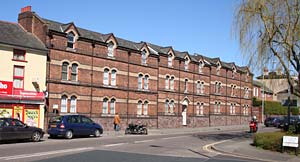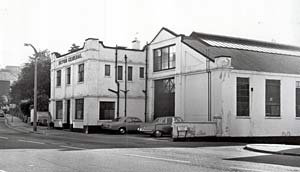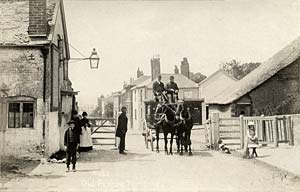
Blackboy Road (Bath Road)
Page updated 20 June 2009
This road is
named after the Black Boy Inn which
used to stand in the road. Royalists met at the inn, plotting the
overthrow of Oliver Cromwell, and named it
the after the future King Charles II, whose mother, Queen Henrietta
Maria nicknamed him 'blackboy'.
The name does not start to appear in the Flying Post until 1849,
indicating a rename at this time.
Looking up Blackboy Road from the Sidwell Street, Old Tiverton Road
roundabout the building on the right replaced a bomb damaged area - it
was built for Sanderson's the wallpaper,
and soft furnishing company. The pre 1942 line of the road runs
parallel to the road from the roundabout for about 100 metres. Blackboy
Road served as the main route out of Exeter
to Taunton, Bristol and Bath, and was often referred to as the Bath
Road.
The historian, Jenkins wrote of a fire in 1799 at the Blackboy
Turnpike:
"On the 28th day of July
a
dreadful
fire, which consumed thirteen houses, inhabited chiefly by poor
weavers, happened (at) the Black Boy
Turnpike, in-the parish of St Sidwell; occasioned by a brick kiln being
erected-too near a large stack of furze, which taking fire,
communicated itself to the adjoining houses. By
this accident a number of poor families were reduced to great distress."
Blackboy Road had at least one brickworks with a boundary on the
road. Horrell's brickworks was between Grosvenor Place and
Silver Lane. After Mr Horrell died in 1849, it is probable that the
works were taken over by Mr Hooper.
The Blackboy or Withyridge
Tollgate was at the start of the Pinhoe
Road, on the Polsloe Road side of the junction. It was removed after
the turnpike trust expired in 1884. This
end of Blackboy Road was also the terminus of the horse drawn tramway -
the electric tramway continued as far as St Marks Church.
In 1873, the City of Exeter Improved Industrial Dwellings Company
was formed for 'providing commodious
and healthy dwellings for the poor classes'. The tenement
Kendall's Building or the Improved Industrial Dwellings in Blackboy
Road was built by the company in 1876, along with Mermaid Yard in the
West Quarter. The Streets Committee considered, in 1879, a petition
from the butchers in the eastern part of the city for a slaughter house
to be provided in Blackboy Road to supplement the Exe Island slaughter
house. After some deliberation, the committee turned the proposal down.
The next year, they approved the expenditure of £45 to improve the
roadway.
Rivalry between the City Council and the Urban District Council, Heavitree near
Exeter, as they termed themselves, would sometimes emerge with
ironic laughter at the Street Committee meetings. In 1900, such a
moment occurred when Heavitree Council wrote to the City Council
complaining of the "ponding of water
at the junction of Polsloe-road with Blackboy-road" just inside
the city boundary. "The Town Clerk
said he was very glad to see that they were willing to confer with them
on some subject. (Laughter)" It was only a few years since the
tollgate was removed at this point, and the rather rural nature of the
outer suburbs of the city are highlighted by the newspaper report.
World War One Dead - Blackboy/Bath Road
Private, R G Heaman, Devonshire Regiment. 28 August
1915. Husband of F. J. Heaman, of 1, Spinning Path, Bath Rd.,
Rifleman,
J Murch, King's Royal Rifle Corps. 25 June 1917. Age 19. Blackboy Rd
Private,
Alfred Partridge, Devonshire Regiment. 12 August 1917. Age 29. Salem
Place, Bath Rd
Able Seaman, George Richard Pyne, H.M.S. "Vala.",
Royal Navy. 21 August 1917. Age 19. Son of Lucy Pyne, of 14, Bath Rd
Officer's
Steward 3rd Class, Harry Pyne, H.M.S. "Vala.", Royal Navy. 21 August
1917. Age 24. Son of Lucy Pyne, of 14, Bath Rd
Quartermaster
Serjeant, Henry Siddell, Royal Army Medical Corps. 18 December 1918.
Hampton Place, Bath Road
World War Two Blitz Dead
In the first fatal bombing raid of the Second World War on Exeter on the 17th September 1940, four people were killed at 72 Blackboy Road. The mother of the four boys killed, Mrs Florence Squire was pulled from the rubble suffering shock and slight injuries. The house was demolished with a single H.E. bomb.
George Alfred Squire, age 17
James William Squire,
age 8
John Arnall Squire, age 12
Sidney Robert Squire, age 3
 Kendall's
Building
in Blackboy Road. The road on the right is Silver Lane.
Kendall's
Building
in Blackboy Road. The road on the right is Silver Lane.
 Devon General bus garage, Silver Lane,
Blackboy Road. This site became Sanderson's which was itself,
demolished recently. Courtesy the Express & Echo.
Devon General bus garage, Silver Lane,
Blackboy Road. This site became Sanderson's which was itself,
demolished recently. Courtesy the Express & Echo. The Withyridge Toll gate with Henry's Bar formerly the Mount Pleasant
behind the stage coach.
The Withyridge Toll gate with Henry's Bar formerly the Mount Pleasant
behind the stage coach.
Some 19th-Century streets off Blackboy
Road
Prospect Place
Silver Lane
Grosvenor Place
Reynold's
Court
Wellington Place
Passmore's Court
Taylor's Court
Horwill's
Court
Clarence Place
│ Top of Page │